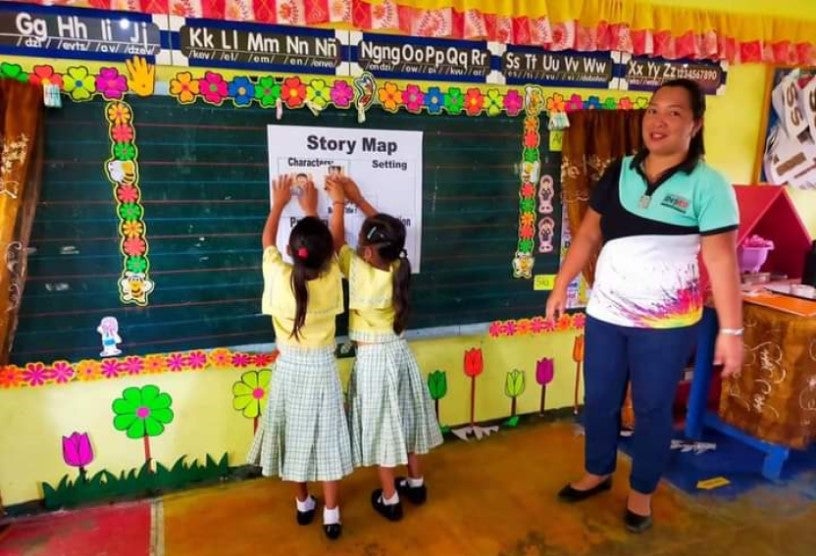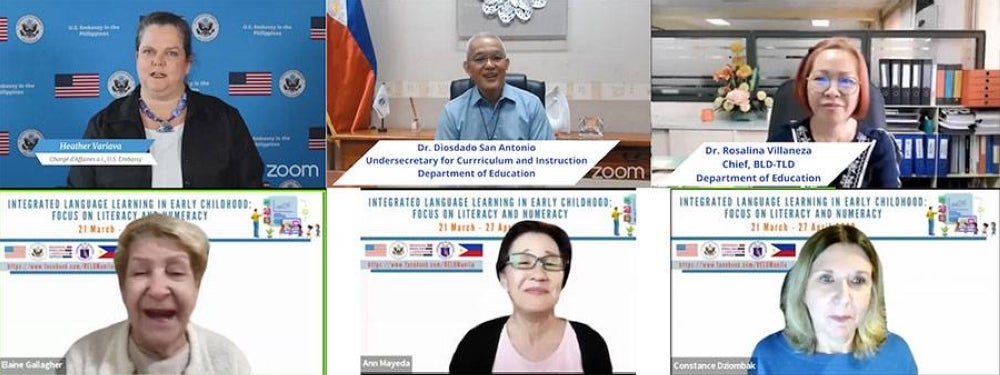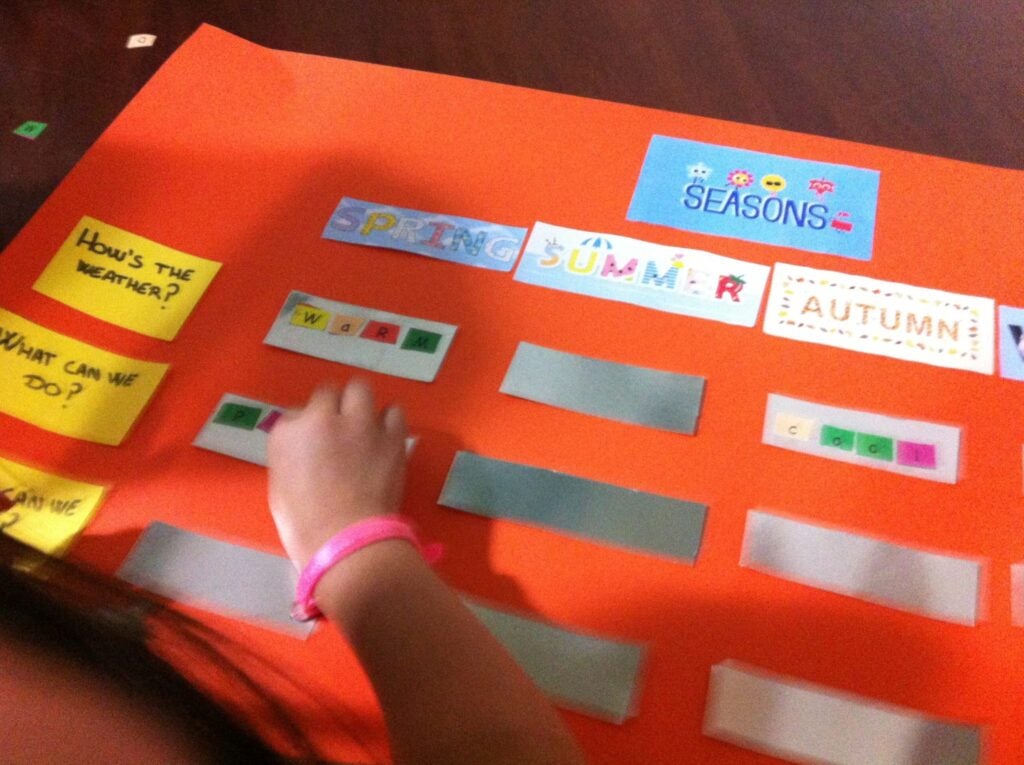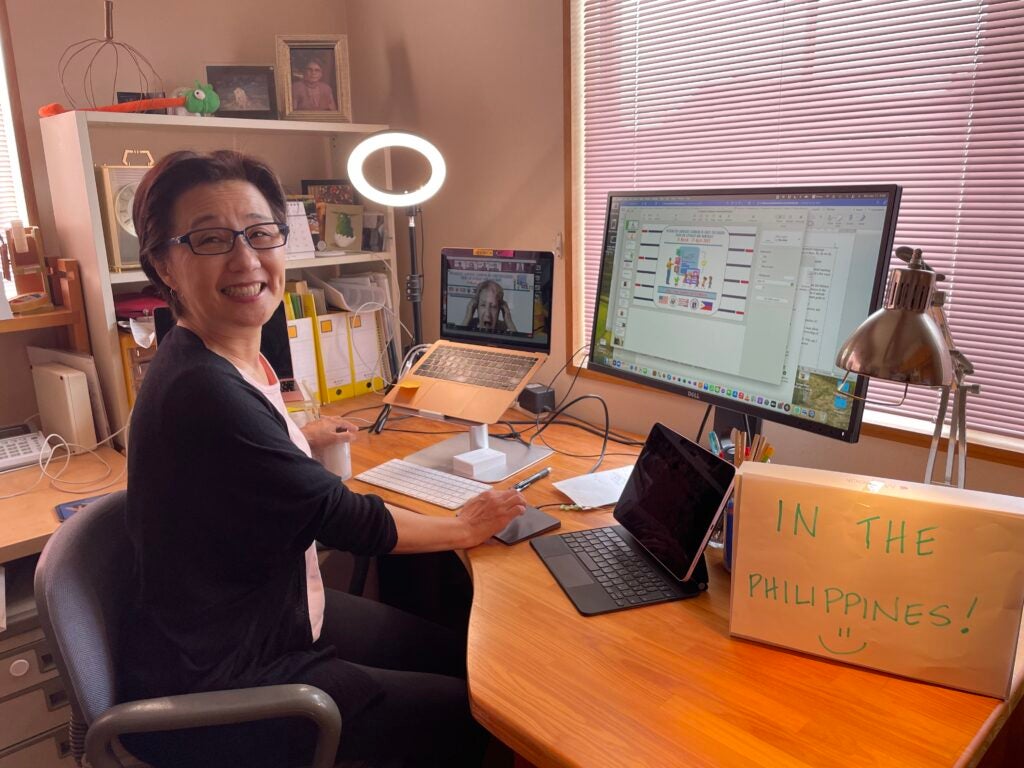Working online from Maine, New York, and Japan, the team met frequently to develop the series syllabus.
Imagine creating a six-week online webinar series on early childhood literacy for over 3,000 Filipino K-3 English teachers, many without internet service, located across the Philippines’ 7,500-island archipelago, and possessing varied language and teaching skills.
In spring 2022, English Language Specialists Constance Dziombak, Elaine Gallagher, and Ann Mayeda did exactly that. The goals of the series – titled “Integrated Language Learning in Early Childhood” – were ambitious: not only sharing best practices in literacy methodology but also addressing the gaps in Filipino students’ reading skills due to the disruption of in-class education during COVID-19.
Each Specialist was tasked with preparing two 2-hour seminars, which were repeated twice to accommodate the teachers’ schedules. Recordings were also made available offline for those without reliable internet.
Elaine Gallagher’s two webinars about the fundamentals of CLIL bookended the series. In her first segment, “What is Content and Language Integrated Learning (CLIL)?”, Gallagher covered the essentials of CLIL – that is, studying a content subject (e.g., history or math) in the target language (in this case, English) – and laid the groundwork for subsequent presentations.
Gallagher began by explaining what CLIL is, as well as what it is not: “It’s not a method or a program. It’s a philosophy,” Gallagher explained. “Teachers often ask how they can teach in a language that students don’t know. If you speak in English, that’s a CLIL lesson.”
Another myth that Gallagher dispelled was the idea that K-3 students should learn grammar. “Teachers ask, ‘Don’t we have to explain singular and plural?’ Gallagher said. The answer is a simple ‘no’.” To illustrate her point, Gallagher showed participants two pictures. “This is a boy. These are boys. We don’t have to explain singular and plural. Just start using it.” That advice goes for tenses too: no need to use grammatical terms to get the message across. The final webinar in the series, also helmed by Gallagher, focused on similar themes, and dug into the differences between teaching English and teaching in English.
Ann Mayeda’s two sessions on “Bilingualism and Balancing Content” and “Attitude Goals in the Classroom” came next. For all three team members, knowing about the linguistic environment was essential in designing the course. For example, they learned that although English and Filipino are the two national languages, the nation’s 110 million inhabitants speak about 180 languages, some of which are not written. As Mayeda explained, when children have never been exposed to books or written language, it increases the challenge for teachers. Pupils may not even know how to hold a book, let alone recognize letters and sentences. They must learn these fundamentals before teachers can proceed with more advanced skills, such as connecting letters to sounds.
Mayeda showed attendees how to do a book walk, an activity done with learners before they attempt to read an unfamiliar text. The teacher “walks” through the book while discussing the text and graphic features, allowing the students to anticipate the meaning of the story while they learn to read. During the presentation, Mayeda’s colleagues played the roles of 5-year-olds and gave reactions to the reading – perhaps not an authentic version of a book walk but certainly entertaining – as well as informative – for the teacher trainees.
Constance Dziombak’s two sessions were “Fundamentals in Early Literacy” and “Developing Literacy Skills.” She started with an exploration of oral language development, and its links to vocabulary acquisition, in the first session; in her second session, she introduced strategies for alphabet awareness to the teachers in attendance.
Several activities in her sessions emphasized the link between literacy and oral language, for example in a version of ‘I spy with my little eye something beginning with the letter X.’ This vocabulary builder can be used multiple ways, including as a homework assignment. Even if students don’t have a digital device to take and store pictures of items that begin with the day’s letter (e.g. boy, ball, book), they can always draw the items and create a paper album.

Dziombak also showed the teachers how to use ‘think-pair-share’ to maximize participation, focus attention, and engage students in comprehending reading material, critical outcomes for K-3 learners. She was impressed, particularly, with the extent to which teachers were able to adapt the graphic organizers and pattern poems she introduced. While many teachers shared pattern poems their students had written in English, some shared poems their lower-level students had created in their first language. “This is important because we were learning strategies as much as we were learning English,” she adds.
The three Specialists agreed that the Regional English Language Office team in Manila – RELO Carleen Velez and RELO Assistant Conchita Chico – did a remarkable job putting together this project at the request of the Philippines Department of Education. While some specific objectives were provided, exactly how to put together the series was left to the Specialists – who had never met before, let alone worked together. Working online from Maine, New York, and Japan, the team met frequently to develop the series syllabus. Throughout the prep period and then the six weeks of the series itself, they supported each other, as they continually tweaked their presentations, especially as they learned more about their teacher trainees. During sessions, they moderated the Zoom chat box for each other, posting and answering questions, annotating session content, and adding polls.
Clearly, this project has met all of the objectives of the English Language Specialist Program. U.S. State Department Global Program Officer Tony Newman notes that “by advancing English language education, encouraging critical thought and erudition, celebrating cultural diversity, and showcasing professional and civic engagement strategies in the Philippines, these three experts are successfully meeting the needs of their audience and representing the Specialist Program on a global stage.”
With a Facebook reach of over 700,000 people in addition to webinar attendees, the U.S. Embassy in Manila is now looking forward to a second phase of the project. In late July, Gallagher, Mayeda and Dziombak will be coming to the Philippines to work in person with a subset of the teacher cohort they engaged with virtually during the webinar series. RELO Velez says that this next round of workshops will emphasize materials development to reinforce the concepts introduced in the first phase. The Specialists will then share an in-person iteration of their webinar series at Philippine Normal University, the premier teacher training college in the Philippines, for an audience of in-service and pre-service teachers in early August.
To learn more about this Specialist project or to watch recordings of the webinar series please visit RELO Manila’s Facebook page.



